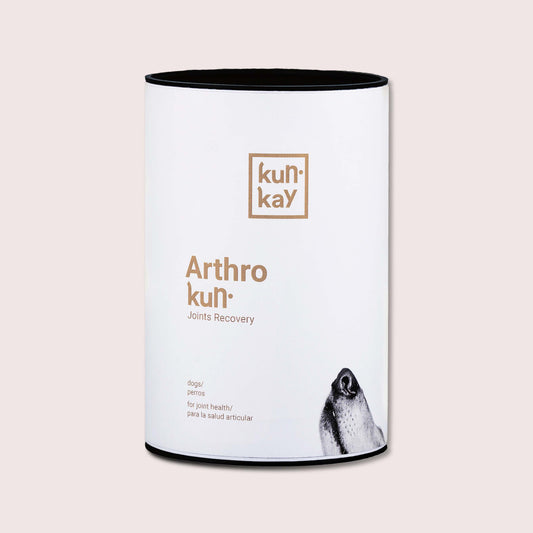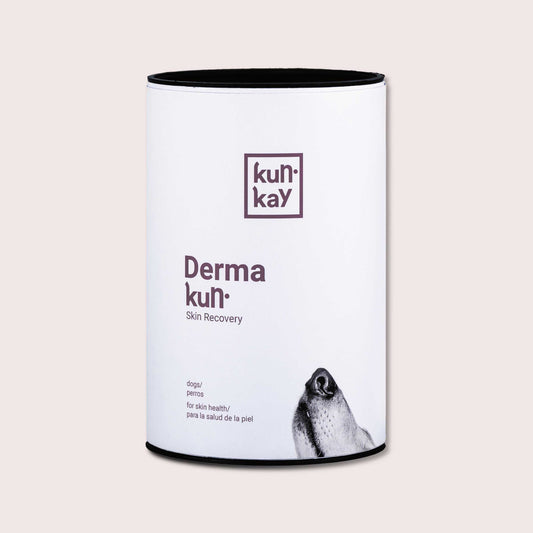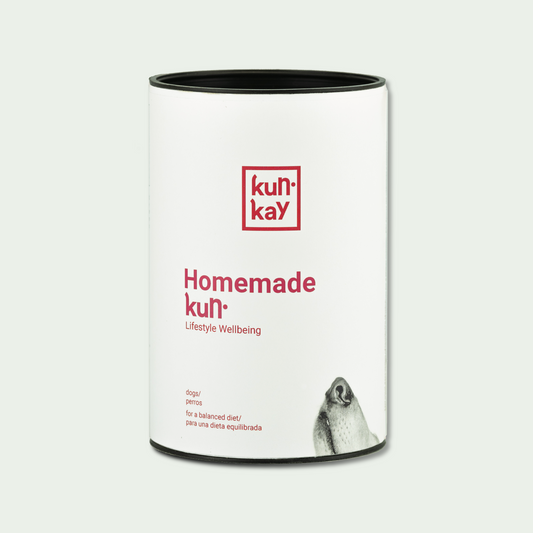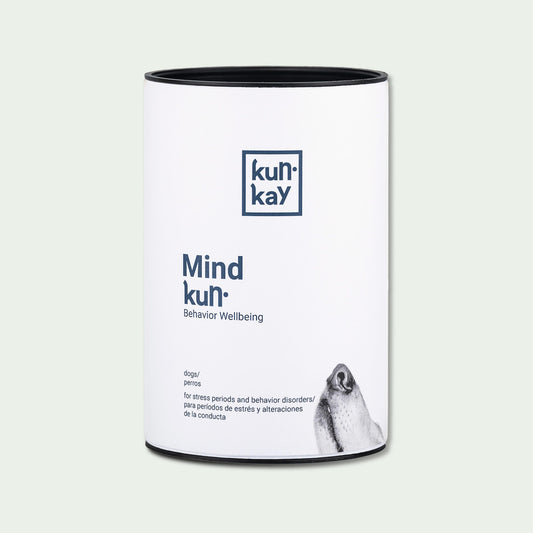Gastroenteritis in dogs: What is it? How to treat it? Most common causes and symptoms
Gastroenteritis in dogs is a quite common problem that can affect both adult animals and puppies. Its causes are very diverse, as are the consequences it can have for your dog's health.
For your peace of mind, with proper treatment, an adequate diet, and, if necessary, the support of vitamins and supplements for dogs specially designed to care for their intestinal health, gastroenteritis will only mean a few bad days for your pet.
However, it is essential that if you notice your dog has diarrhea, vomiting, or any other persistent gastroenteritis symptom, you immediately go to the vet so they can determine the cause of the problem and tell you how to act to avoid serious consequences.

At Kun-Kay we help you take care of your four-legged companion by offering you the best natural supplementation so they have ironclad health. We design specific solutions to give your dog that extra boost they need to enjoy many years with you. Also, on our blog, we tell you how to act against the main problems that threaten your pet's health. This time, we explain everything you need to know about gastroenteritis in dogs and answer some frequently asked questions about this problem. Also, to help you, we have prepared this guide on What can dogs eat? Stay with us and take note of all the keys!
1. What is gastroenteritis? Most common symptoms
Gastroenteritis is an inflammation or irritation of the inner membranes of the digestive tract (small intestine, large intestine, and/or stomach) that mainly affects the gastric and intestinal mucosa, altering its function.
It can occur both in adult animals and puppies, although the latter are more prone to suffer from it because their immune system is still developing. There are also breeds more predisposed to this type of problem such as German Shepherds, Shar Peis, Rottweilers, and Boxers.
Diarrhea and vomiting are the most common symptoms of gastroenteritis in dogs, although the following can also occur:
- Loss of appetite and thirst.
- Dehydration, you will notice their mucous membranes are dry.
- Apathy and lethargy.
- Abdominal cramps.
- They will not let you touch the abdominal area and hindquarters.
- Fever.
2. Should I always go to the vet?
Mild gastroenteritis can be treated at home but at the slightest warning sign and if the problem lasts longer than usual, it is essential to go to the vet. In the case of puppies, it is recommended to always go to the vet since there is a higher risk of dehydration due to their small size.
In adult dogs, these are some warning signs that indicate you should take your dog to the vet:
- If vomiting or diarrhea is very frequent even after removing food or if it lasts more than two days and you do not see improvement.
- If you notice they have fever or excessive pain.
- If there is blood in their stools or vomit.
Of course, you should also go to the vet immediately if you have detected that your pet may have ingested any dangerous food or substance.
3. How long does it last?
Acute gastroenteritis, the most common, usually lasts between two and three days. If it lasts longer without improvement, it would be persistent or chronic gastroenteritis if it lasts more than three or four weeks.
Of course, in the case of persistent or chronic gastroenteritis in dogs, veterinary assistance is essential. Therefore, if after a couple of days you do not notice your dog is better, it is important to go to the vet.
4. Most common causes
As we mentioned before, gastroenteritis in dogs can appear for many reasons. Although it is common to think that our pet vomited or has diarrhea because they ate something bad, these problems can also be due to other causes.
Next, we will see the most common causes of gastroenteritis in dogs.
1. Bacteria
Bacteria can cause diarrhea and vomiting in dogs in two ways: by producing toxins or invading and damaging cells.
The most common are bacteria that cause diarrhea by malabsorption, producing cytotoxicity. On the other hand, bacteria that cause cell damage generate inflammation and can cause infection.
2. Viruses
In this case, viruses attack the animal's intestinal cells causing gastroenteritis with symptoms such as watery diarrhea, abdominal pain or cramps, nausea, vomiting, and sometimes fever.
3. Intestinal parasites
They are one of the most common causes of diarrhea in dogs and cats since they cause a lesion in the intestinal mucosa that can even lead to perforation. Also, intestinal parasites can cause ulcers, inflammation, and obstructions.
4. Spoiled food or contaminated water
The most common and harmless origin of gastroenteritis in dogs is the consumption of spoiled food. Dogs are usually not very selective and tend to eat anything when given the opportunity, which sometimes leads them to eat garbage and other discarded foods that cause stomach upset.
Related to this cause, we can also mention others such as feeding the dog a homemade diet without considering their needs (dogs that eat “human food,” for example) or when sudden changes are made in the diet, such as abruptly changing the brand or type of kibble.
5. Intestinal obstructions
Intestinal obstructions can cause a partial or total blockage and can be fatal if not diagnosed in time. In many cases, emergency surgery is necessary.
Obstructions can appear due to ingestion of foreign bodies that the dog cannot digest, the presence of intestinal parasites or the presence of a tumor, among other causes.
6. Fungal infection
Fungal infections are caused by fungi. Usually, fungi tend to cause infections on the dog's skin and mucous membranes - they are one of the most common causes of dermatitis in dogs, for example - although they can also affect their digestive system, but this is not common.
7. Prolonged stress
Stress is terrible for dogs and can seriously affect their health and well-being, both emotionally and physically. Sudden changes or lack of routines, lack of rest or socialization, spending many hours alone at home, moving, the arrival of a new family member, or a death are just some of the causes that can stress your pet.
Dogs with stress can show many different symptoms such as hair loss, compulsive barking, or behavioral problems. In especially stressful situations, they can even have diarrhea and vomiting, suffering a lot.
To help you care for your pet's mental health, at Kun-Kay we have developed Mindkun, a dietary supplement that will help them in those moments when it is inevitable that they have to go through situations that disrupt their calm. Mindkun helps your pet relax so they can adapt more easily to any change and be much happier.
5. Proper diet to prevent gastroenteritis in our dog
The key to preventing gastroenteritis in dogs is to provide a healthy and balanced diet that provides all the nutrients and vitamins they need to grow healthy and happy.
Your dog needs a diet designed specifically for them or, if you prepare their food yourself, an adequate supplementation to complement it.
Also, it is important to avoid sudden changes in their diet. For example, if you want to change kibble, do not wait to finish one to start the new one; mix them so their stomach can gradually get used to it.
6. Do seasonal changes really affect them?
It depends on the dog and how abrupt the change is. It is common for many dogs to suffer diarrhea in hot seasons and some are affected by the change from spring to summer, especially in areas where spring is humid and summer is hot.
7. Recommended treatments
If your dog has diarrhea, it is very important to know what you can do to help. We propose some treatments and solutions to relieve this problem and speed up recovery, including some of our supplements for dogs specially designed to care for their intestinal health. Take note!
1. Hydration
Very important! If your dog has gastroenteritis, they will lose a lot of fluids and minerals, so you must ensure they always have fresh water nearby. Encourage them to drink to avoid dehydration, it is important they drink as much as possible.
2. Nutraceuticals
Nutraceuticals are natural alternatives to traditional drugs used to help balance your dog's intestinal flora. They have the advantage of avoiding the side effects that some drugs may have since their origin is natural.
3. Fiber intake
Although fiber is commonly associated with helping bowel movements, its value lies in its power to balance intestinal flora, so it can be very beneficial to help your dog recover from gastroenteritis. A fiber-rich food they love is pumpkin, which you can give as a snack.
4. Enterokun Mild or Severe
Both Enterokun Mild and Enterokun Severe are two supplements specially designed to care for your pet's intestinal health.
- Enterokun Mild is perfect for preventive use in dogs prone to this problem and during their recovery.
- Enterokun Severe is recommended for animals with severe diarrhea and focuses on your furry friend's recovery. It counteracts stomach imbalance, helps them stay hydrated, and balances their intestinal microbiota.
5. Superyellowkun
Superyellowkun is a supplement that will help you promote your dog's digestive well-being. It can be used to reduce digestive discomfort and prevent its onset and is recommended if your pet has stomach and intestinal discomfort such as nausea, vomiting, gastritis, constipation (Constipation in dogs), anal gland discomfort, or mild diarrhea.




